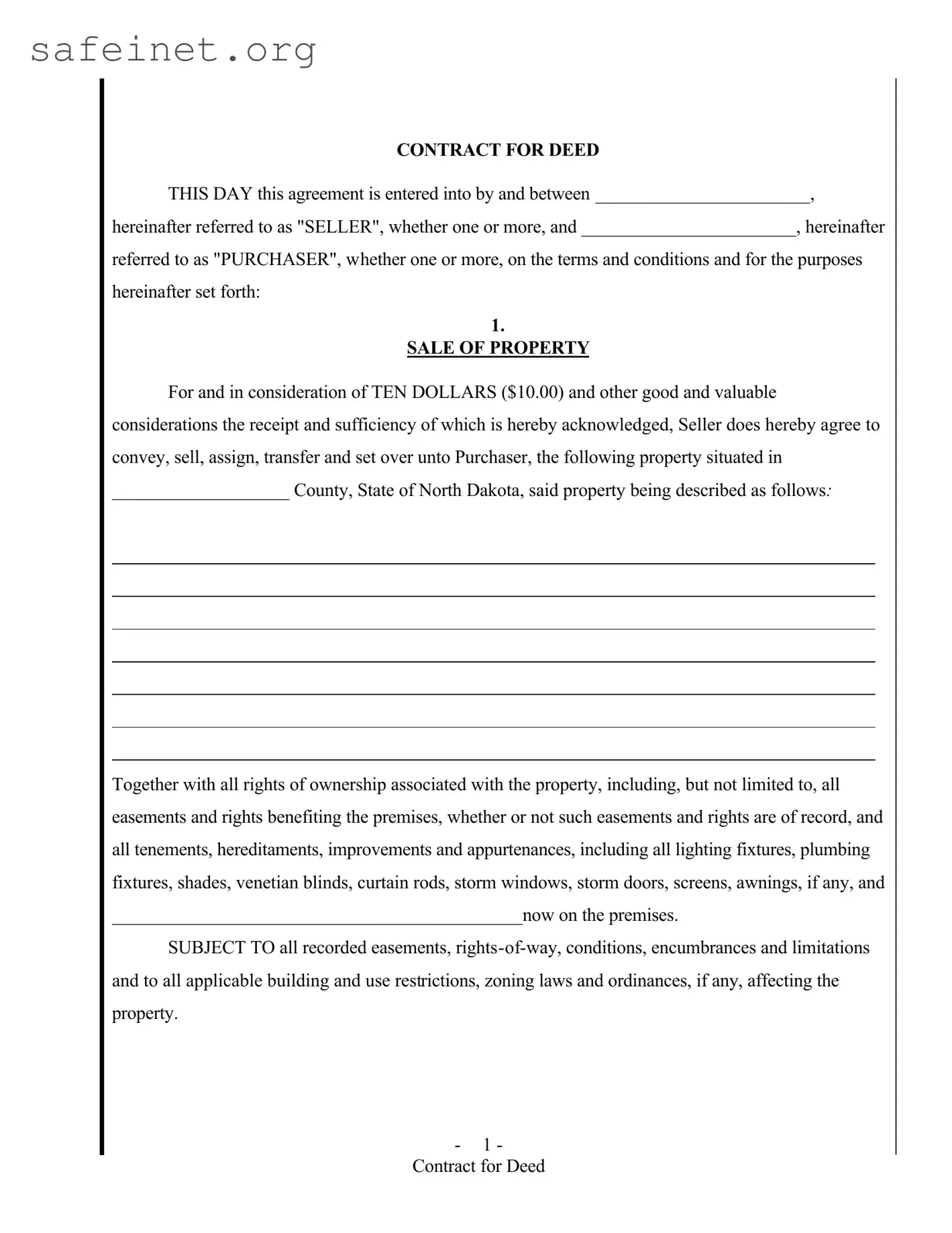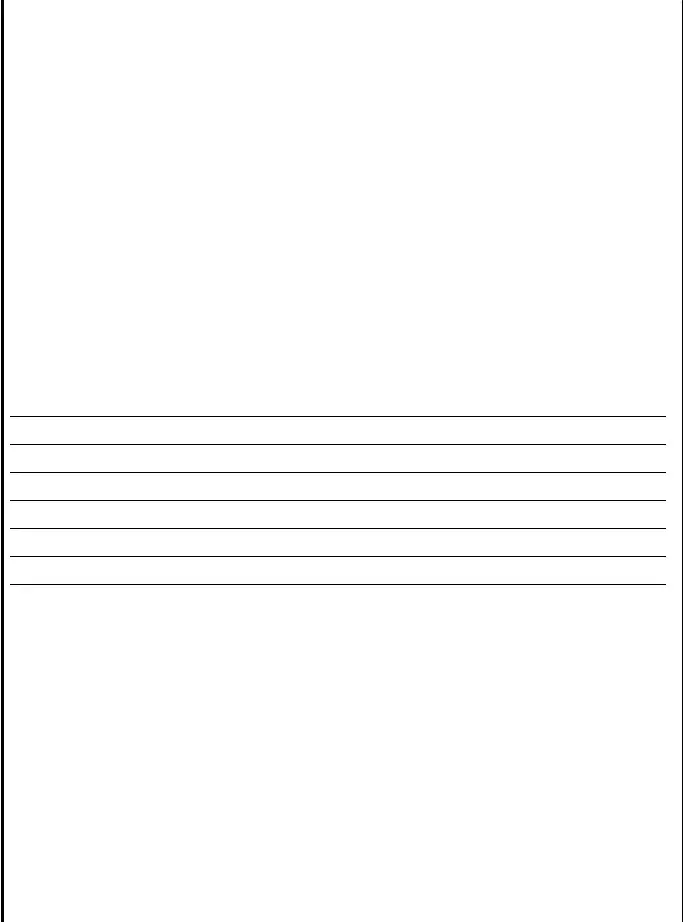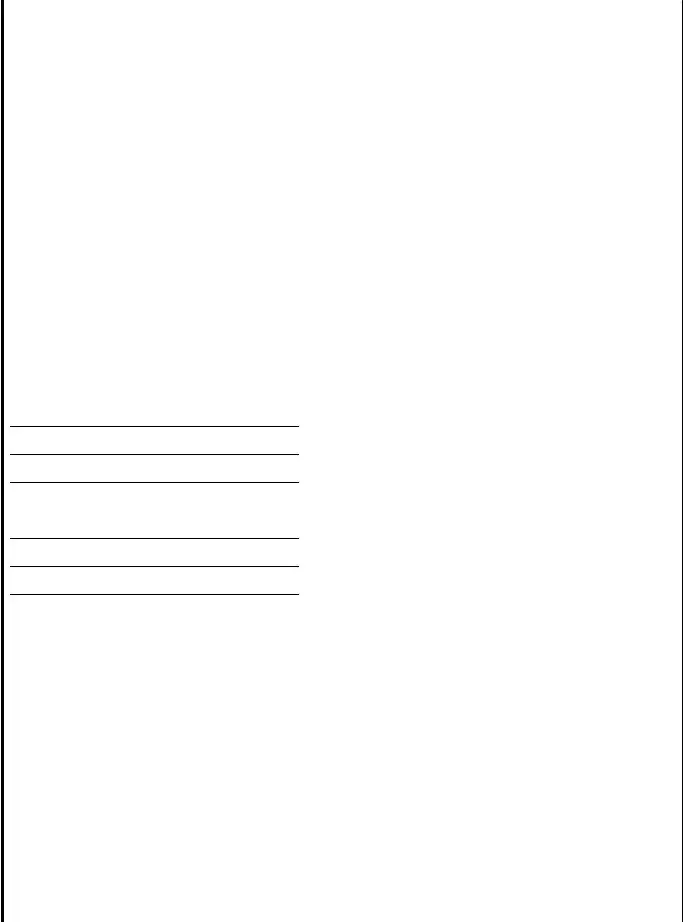CONTRACT FOR DEED
THIS DAY this agreement is entered into by and between _______________________,
hereinafter referred to as "SELLER", whether one or more, and _______________________, hereinafter
referred to as "PURCHASER", whether one or more, on the terms and conditions and for the purposes hereinafter set forth:
1.
SALE OF PROPERTY
For and in consideration of TEN DOLLARS ($10.00) and other good and valuable considerations the receipt and sufficiency of which is hereby acknowledged, Seller does hereby agree to convey, sell, assign, transfer and set over unto Purchaser, the following property situated in
___________________ County, State of North Dakota, said property being described as follows:
Together with all rights of ownership associated with the property, including, but not limited to, all easements and rights benefiting the premises, whether or not such easements and rights are of record, and all tenements, hereditaments, improvements and appurtenances, including all lighting fixtures, plumbing fixtures, shades, venetian blinds, curtain rods, storm windows, storm doors, screens, awnings, if any, and
____________________________________________now on the premises.
SUBJECT TO all recorded easements, rights-of-way, conditions, encumbrances and limitations and to all applicable building and use restrictions, zoning laws and ordinances, if any, affecting the property.
- 1 -
Contract for Deed
2.
PURCHASE PRICE AND TERMS
The purchase price of the property shall be $____________________. The purchaser does
hereby agree to pay to the order of the Seller the sum of ___________________ Dollars
($_______________) upon execution of this agreement, with the balance of $__________________
being due and payable as follows:(Select one)
(a) Balance payable in __________ (_______) monthly installments of ______________
Dollars ($_________) each, with the first installment being due and payable on the ____ day of
_______________, 20____ and a like payment on the first day of each month thereafter until the
______ day of ________________, 20____, when the final payment shall be due. No interest.
(b) Balance payable, together with interest on the whole sum that shall be from time to time unpaid at the rate of _______ per cent, per annum, payable in the amount of $____________
dollars per month beginning on the _____ day of ____________, 20____ and continuing on the
same day of each month thereafter until fully paid.
(c) Balance payable, together with interest on the whole sum that shall be from time to time unpaid at the rate of _______ per cent, per annum, payable in the amount of
_____________________ dollars per month beginning on the ________ day of
_______________, 20____, and continuing on the same day of each month thereafter until the
______ day of _______________, 20____, when all remaining principal and interest shall be
paid. (Balloon payment)
If interest is charged, interest shall be computed monthly and deducted from payment and the balance of payment shall be applied on principal.
3.
TIME OF THE ESSENCE
Time is of the essence in the performance of each and every term and provision in this agreement by Purchaser.
- 2 -
Contract for Deed
4.
SECURITY
This contract shall stand as security of the payment of the obligations of Purchaser.
5.
MAINTENANCE OF IMPROVEMENTS
All improvements on the property, including, but not limited to, buildings, trees or other improvements now on the premises, or hereafter made or placed thereon, shall be a part of the security for the performance of this contract and shall not be removed there from. Purchaser shall not commit, or suffer any other person to commit, any waste or damage to said premises or the appurtenances and shall keep the premises and all improvements in as good condition as they are now.
6.
CONDITION OF IMPROVEMENTS
Purchaser agrees that the Seller has not made, nor makes any representations or warranties as to the condition of the premises, the condition of the buildings, appurtenances and fixtures locate thereon, and/or the location of the boundaries. Purchaser accepts the property in its "as-is" condition without warranty of any kind.
7.
POSSESSION OF PROPERTY
Purchaser shall take possession of the property and all improvements thereon upon execution of this contract and shall continue in the peaceful enjoyment of the property so long as all payments due under the terms of this contract are timely made. Purchaser agrees to keep the property in a good state of repair and in the event of termination of this contract, Purchaser agrees to return the property to Seller in substantially the same condition as it now exists, ordinary wear and tear excepted. Seller reserves the right to inspect the property at any time with or without notice to Purchaser.
8.
TAXES, INSURANCE AND ASSESSMENTS
Taxes and Assessments: During the term of this contract:(Select one)
- 3 -
Contract for Deed
(a) Purchaser shall pay all taxes and assessments levied against the property.
(b) Seller shall pay all taxes and assessments levied against the property. In the event that Seller pays the taxes and insurance, Purchaser shall reimburse Seller for same upon 30 days notice to purchaser.
Content Insurance: Purchaser shall be solely responsible for obtaining insurance of the contents, insuring contents owned by Purchaser. Seller shall be solely responsible for obtaining insurance on all contents owned by Seller.
Liability and Hazard Insurance: Liability insurance shall be maintained by Purchaser during the term of this contract naming Seller as an additional insured, in the amount of not less than $________________.
Fire, Hazard and Windstorm insurance: Fire, hazard and windstorm insurance shall be maintained as follows: (Select one)
(a) Purchaser shall obtain fire, hazard and windstorm insurance in the amount not less than $_______________, on a policy of insurance naming Seller as additional insured.
(b) Seller shall obtain and pay for hazard, fire and windstorm insurance in an amount not less than $ _________________. In the event Seller elects this option, Purchaser shall repay the
amount so paid by Seller within thirty (30) days of demand for same by Seller.
Should the Purchaser fail to pay any tax or assessment, or installment thereof, when due, or keep said buildings insured, Seller may pay the same and have the buildings insured, and the amounts thus expended shall be a lien on said premises and may be added to the balance then unpaid, or collected by Seller, in the discretion if Seller with interest until paid at the rate of the ______________ per cent per
annum.
In case of any damage as a result of which said insurance proceeds are available, the Purchaser may, within sixty (60) days of said loss or damage, give to the Seller written notice of Purchaser’s election to repair or rebuild the damaged parts of the premises, in which event said insurance proceeds shall be used for such purpose. The balance of said proceeds, if any, which remain after completion of said repairing or rebuilding, or all of said insurance proceeds if the Purchaser elects not to repair or rebuild, shall be applied first toward the satisfaction of any existing defaults under the terms of this contract, and then as a prepayment upon the principal balance owing. No such prepayment shall defer the time for payment of any remaining payments required by said contract. Any surplus of said proceeds
- 4 -
Contract for Deed
in excess of the balance owing hereon shall be paid to the Purchaser.
9.
DEFAULT
If the Purchaser shall fail to perform any of the covenants or conditions contained in this contract on or before the date on which the performance is required, the Seller shall give Purchaser notice of default or performance, stating the Purchaser is allowed fourteen (14) days from the date of the Notice to cure the default or performance. In the event the default or failure of performance is not cured within the
14 day time period, then Seller shall have any of the following remedies, in the discretion of Seller:
(a)give the Purchaser a written notice specifying the failure to cure the default and informing the Purchaser that if the default continues for a period of an additional fifteen (15) days after service of the notice of failure to cure, that without further notice, this contract shall stand cancelled and Seller may regain possession of the property as provided herein; or
(b)give the Purchaser a written notice specifying the failure to cure the default and informing the Purchaser that if the default continues for a period of an additional fifteen (15) days after service of the notice of failure to cure, that without further notice, the entire principal balance and unpaid interest shall be immediately due and payable and Seller may take appropriate action against Purchaser for collection of same according to the laws of the State of
____________________.
In the event of default in any of the terms and conditions or installments due and payable under
the terms of this contract and Seller elects 9(a), Seller shall be entitled to immediate possession of the property.
In the event of default and termination of the contract by Seller, Purchaser shall forfeit any and all payments made under the terms of this contract including taxes and assessments as liquidated damages, Seller shall be entitled to recover such other damages as they may be due which are caused by the acts or negligence of Purchaser.
The parties expressly agree that in the event of default not cured by the Purchaser and termination of this agreement, and Purchaser fails to vacate the premises, Seller shall have the right to obtain possession by appropriate court action.
- 6 -
Contract for Deed
10.
DEED AND EVIDENCE OF TITLE
Upon total payment of the purchase price and any and all late charges, and other amounts due Seller, Seller agrees to deliver to Purchaser a Warranty Deed to the subject property, at Seller’s expense, free and clear of any liens or encumbrances other than taxes and assessments for the current year.
11.
NOTICES
All notices required hereunder shall be deemed to have been made when deposited in the U. S. Mail, postage prepaid, certified, return receipt requested, to the Purchaser or Seller at the addresses listed below. All notices required hereunder may he sent to:
Seller:
Purchaser:
and when mailed, postage prepaid, to said address, shall be binding and conclusively presumed to be served upon said parties respectively.
12.
ASSIGNMENT OR SALE
Purchaser shall not sell, assign, transfer or convey any interest in the subject property or this agreement, without first securing the written consent of the Seller.
- 7 -
Contract for Deed
13.
PREPAYMENT
Purchaser to have the right to prepay, without penalty, the whole or any part of the balance remaining unpaid on this contract at any time before the due date.
14.
ATTORNEY FEES
In the event of default, Purchaser shall pay to Seller, Seller's reasonable and actual attorneys' fees and expenses incurred by Seller in enforcement of any rights of Seller. All attorney fees shall be payable prior to Purchaser's being deemed to have corrected any such default.
15.
LATE PAYMENT CHARGES
If Purchaser shall fail to pay, within fifteen (15) days after due date, any installment due hereunder, Purchaser shall be required to pay an additional charge of five (5%) percent of the late installment. Such charge shall be paid to Seller at the time of payment of the past due installment.
16.
CONVEYANCE OR MORTGAGE BY SELLER
If the Seller's interest is now or hereafter encumbered by mortgage, the Seller covenants that Seller will meet the payments of principal and interest thereon as they mature and produce evidence thereof to the Purchaser upon demand. In the event the Seller shall default upon any such mortgage or land contract, the Purchaser shall have the right to do the acts or make the payments necessary to cure such default and shall be reimbursed for so doing by receiving, automatically, credit to this contract to apply on the payments due or to become due hereon.
The Seller reserves the right to convey, his or her interest in the above described land and such conveyance hereof shall not be a cause for rescission but such conveyance shall be subject to the terms of this agreement.
- 8 -
Contract for Deed
The Seller may, during the lifetime of this contract, place a mortgage on the premises above described, which shall be a lien on the premises, superior to the rights of the Purchaser herein, or may continue and renew any existing mortgage thereon, provided that the aggregate amount due on all outstanding mortgages shall not at any time be greater than the unpaid balance of the contract.
17.
ENTIRE AGREEMENT
This Agreement embodies and constitutes the entire understanding between the parties with respect to the transactions contemplated herein. All prior or contemporaneous agreements, understandings, representations, oral or written, are merged into this Agreement.
18.
AMENDMENT – WAIVERS
This Agreement shall not be modified, or amended except by an instrument in writing signed by all parties.
No delay or failure on the part of any party hereto in exercising any right, power or privilege under this Agreement or under any other documents furnished in connection with or pursuant to this Agreement shall impair any such right, power or privilege or be construed as a waiver of any default or any acquiescence therein. No single or partial exercise of any such right, power or privilege shall preclude the further exercise of such right, power or privilege, or the exercise of any other right, power or privilege. No waiver shall be valid against any party hereto unless made in writing and signed by the party against whom enforcement of such waiver is sought and then only to the extent expressly specified therein.
19.
SEVERABILITY
If any one or more of the provisions contained in this Agreement shall be held illegal or unenforceable by a court, no other provisions shall be affected by this holding. The parties intend that in the event one or more provisions of this agreement are declared invalid or unenforceable, the remaining
- 9 -
Contract for Deed
provisions shall remain enforceable and this agreement shall be interpreted by a Court in favor of survival of all remaining provisions.
20.
HEADINGS
Section headings contained in this Agreement are inserted for convenience of reference only, shall not be deemed to be a part of this Agreement for any purpose, and shall not in any way define or affect the meaning, construction or scope of any of the provisions hereof.
21.
PRONOUNS
All pronouns and any variations thereof shall be deemed to refer to the masculine, feminine, neuter, singular, or plural, as the identity of the person or entity may require. As used in this agreement:
(1)words of the masculine gender shall mean and include corresponding neuter words or words of the feminine gender, (2) words in the singular shall mean and include the plural and vice versa, and (3) the word "may" gives sole discretion without any obligation to take any action.
22.
JOINT AND SEVERAL LIABILITY
All Purchasers, if more than one, covenants and agrees that their obligations and liability shall be joint and several.
23.
PURCHASER’S RIGHT TO REINSTATE AFTER ACCELERATION
If Purchaser defaults and the loan is accelerated, then Purchaser shall have the right of reinstatement as allowed under the laws of the State of North Dakota, provided that Purchaser: (a) pays Lender all sums which then would be due under this agreement as if no acceleration had occurred; (b) cures any default of any other covenants or agreements; and (c) pays all expenses incurred in enforcing this agreement, including, but not limited to, reasonable attorneys' fees, and other fees incurred for the purpose of protecting Seller's interest in the Property and rights under this agreement. Seller may require that Purchaser pay such reinstatement sums and expenses in one or more of the following forms, as
- 10 -
Contract for Deed










